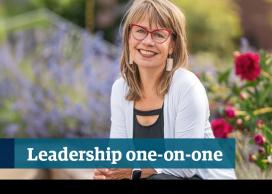Gino DiLabio is the inaugural Dean of the Irving K. Barber Faculty of Science at UBC Okanagan and started his role in September 2020.
In 2014, Dean DiLabio joined UBC Okanagan as Head of the Department of Chemistry. At the end of his term, he served as Dean pro tem for the Irving K. Barber School of Arts and Sciences. Prior to joining UBC, he worked at the National Research Council of Canada’s Steacie Institute for Molecular Science and National Institute for Nanotechnology.
A researcher at heart, Dean DiLabio's research interests are primarily focused on the development and application of new computational chemistry methods. He earned his degrees from Carleton University in Ottawa and Clarkson University in New York.
Dean DiLabio appreciates a good sense of humour and the ability to look at the lighter side of things in life. Outside of work, he enjoys biking, donning the chef’s hat, and singing – especially at family get togethers.
Q1. What quality do you most admire in a leader?
GD: There are some really great leaders at UBC, especially in the Faculty of Science, and I really admire those who uphold the values of honesty, openness, and collaboration. Having a focus on people and making them a part of a shared responsibility and vision is paramount. For instance, being in a decision-making role, I take direction and input from all my colleagues and Faculty council, as our vision can only be realized if it is shared by everyone and reflects the values of our community. In that sense, I appreciate leaders who are open to the views of others and who recognize that we share a common mission.
I also appreciate a leader with a good sense of humour and the ability to enjoy the lighter side of everyday things, especially while working at the university.
Q2. What makes you laugh?
GD: I see humour everywhere. The willingness to see humour in the things around us is essential for making our lives productive and enjoyable every single day.
What also makes me laugh most is seeing other people laugh. For me, laughter is one of the purest expressions of sincerity, and when people are genuinely laughing, they are being their true selves.
Q3. Who inspires you, and why?
GD: I am lucky to be surrounded by so many inspiring people. My Associate Dean of Research, Lael Parrott, does phenomenal work and sees potential and possibility in everything around her. Her energy rubs off one me!
Many of the students in my research group are from other parts of the world. They’ve left their homes to study and do research at UBC – their sense of adventure and bravery is inspiring.
My colleagues in the Faculty of Science also do such inspiring and transformative research. For example, Adam Ford (Department of Biology), Mathieu Bourbonnais (Department of Earth, Environmental and Geographic Sciences), and Thu-Thuy Dang and Isaac Li (Department of Chemistry) are wonderful mentors and research leaders. If I could turn back time, I would have loved to be in one of their research groups and be part of the world-changing research they are engaged in!
Q4. For you, what makes UBCO different?
GD: UBC Okanagan is special because it has the potential to be recognized as a leading destination for people interested in engaging in a more intimate research and learning environment. It represents a synthesis of a beautiful campus and location, strong research, and opportunity. I believe the Okanagan campus has great potential to not only be recognized for its ground-breaking research but also as a campus that attracts researcher leaders from around the world to be part of our community.
Q5. What is the most important lesson you’ve learned, in your career to date?
GD: One of the most important lessons I’ve learned, and one that is immensely valuable in my role, is to make decisions that support people.
Universities are all about people – without students and faculty, universities wouldn’t exist. Therefore, it is extremely important to make decisions and provide support to the people who make up the institution.
Q6. How do you like to recharge?
GD: Biking to and from work is not only a big part of my wellbeing, it’s also one of the many things I enjoy about working on the Okanagan campus.
I also love cooking for my family and friends, and enjoy being creative in the kitchen. I don’t mind being experimental and often discover new dishes when I’m at local restaurants or while travelling globally. My wife is vegetarian, so I cook Indian and Thai dishes for her, and my three sons love meat, so I enjoy making them ribs, brisket and lamb shanks – I cook all of the family favourites!
I also enjoy singing, especially during family get togethers where we pull out instruments and sing our favourite songs.
Q7. What is the best advice you were ever given?
GD: The best advice that I ever received was from one of my mentors – “always ask why”. Curiosity is so important, especially in the realm of research, because it has the power to lead to important scientific outcomes.
As teachers, it’s our responsibility to teach students to ask why so that they can become critical thinkers. This lesson is equally important for leaders and managers, because asking questions about why things are done in a certain way allows us to decide if the way we do things makes sense and if we are doing things for the right reasons.
Q8. What do you value in your colleagues?
GD: I value a sense of shared responsibility and shared accountability in my colleagues.
UBC is an academic institution, and so we all play a role in advancing the university and have to take this responsibility seriously. Having said that, decision making should not be left to one person; everyone should be involved and aware of decisions that are being made. This holds true in any kind of work we do. In a nutshell, accountability is something I greatly appreciate in the people with whom I work.
Q9. What do you hope will be your lasting impact at UBC?
GD: I would like to continue to encourage faculty members and students to engage in the incredible teaching, learning and research opportunities available at UBC Okanagan. My vision for UBCO is also to attract the kind of talent who will play a role in perpetuating a positive working and learning environment.
I believe that the Okanagan campus is a shining jewel of the UBC system. I am passionate about supporting the development of the Okanagan campus into a place that attracts leaders from around the world to be part of our special community. I believe this will be a wonderful lasting impact.
Q10. If you could have a super power, what would it be?
GD: It would be amazing to be able to clone myself!
In leadership roles like mine, we’re constantly juggling multiple tasks – being a researcher, a teacher, as well as contributing to the leadership and management of a Faculty and the campus. It would be great to be able to do multiple things at once… at least this would allow me to give my research group my undivided attention!
Q11. What advice would you give to a young student just starting out?
GD: Embrace every opportunity. Students today have so many opportunities to advance their knowledge and make the most of their education. I encourage students to engage in research opportunities while they’re undergrads – this can be a transformative experience that changes a student’s perspective on their education. I often say that when one starts out in university, they are looking for answers in the back of textbooks… but when they engage in research, they are putting answers in the back of textbooks.
I encourage students to find research mentors in their area of interest. Talk to professors and graduate students about their work – you’ll find that many of them really enjoy sharing their passion for research with others.
Q12. What is your vision for the future of the Irving K. Barber Faculty of Science?
GD: I think of the UBC Okanagan campus and my Faculty interchangeably, so my vision is for it to continue to be recognized as a world-class Faculty in a world-class institution.
The Irving K. Barber Faculty of Science is the largest Faculty in the Okanagan. I want to see it attract exemplary research and education leaders from across the world and become a place where individuals exchange their excitement, enthusiasm and love for scientific endeavour. This will advance our research and support the development and success of our students.
Published: October 31, 2022
Interviewed by: Aditi Ghosh-Mooruth, UBC Internal Communications



